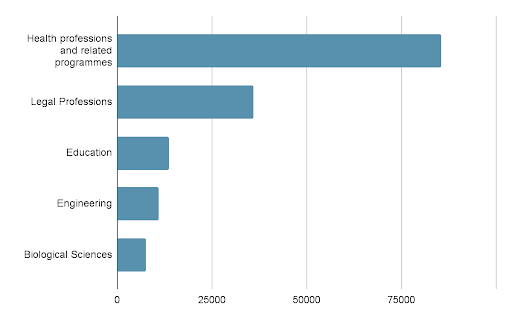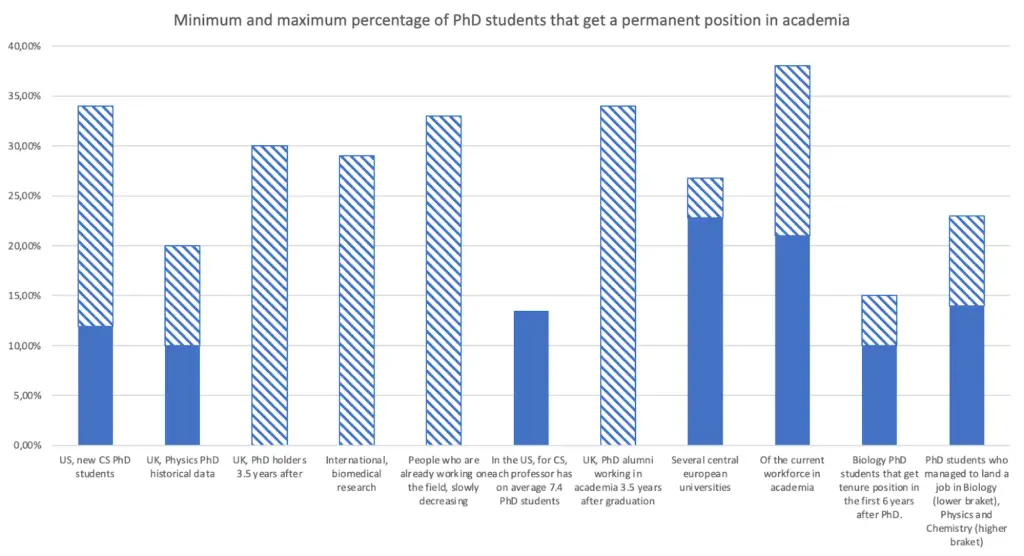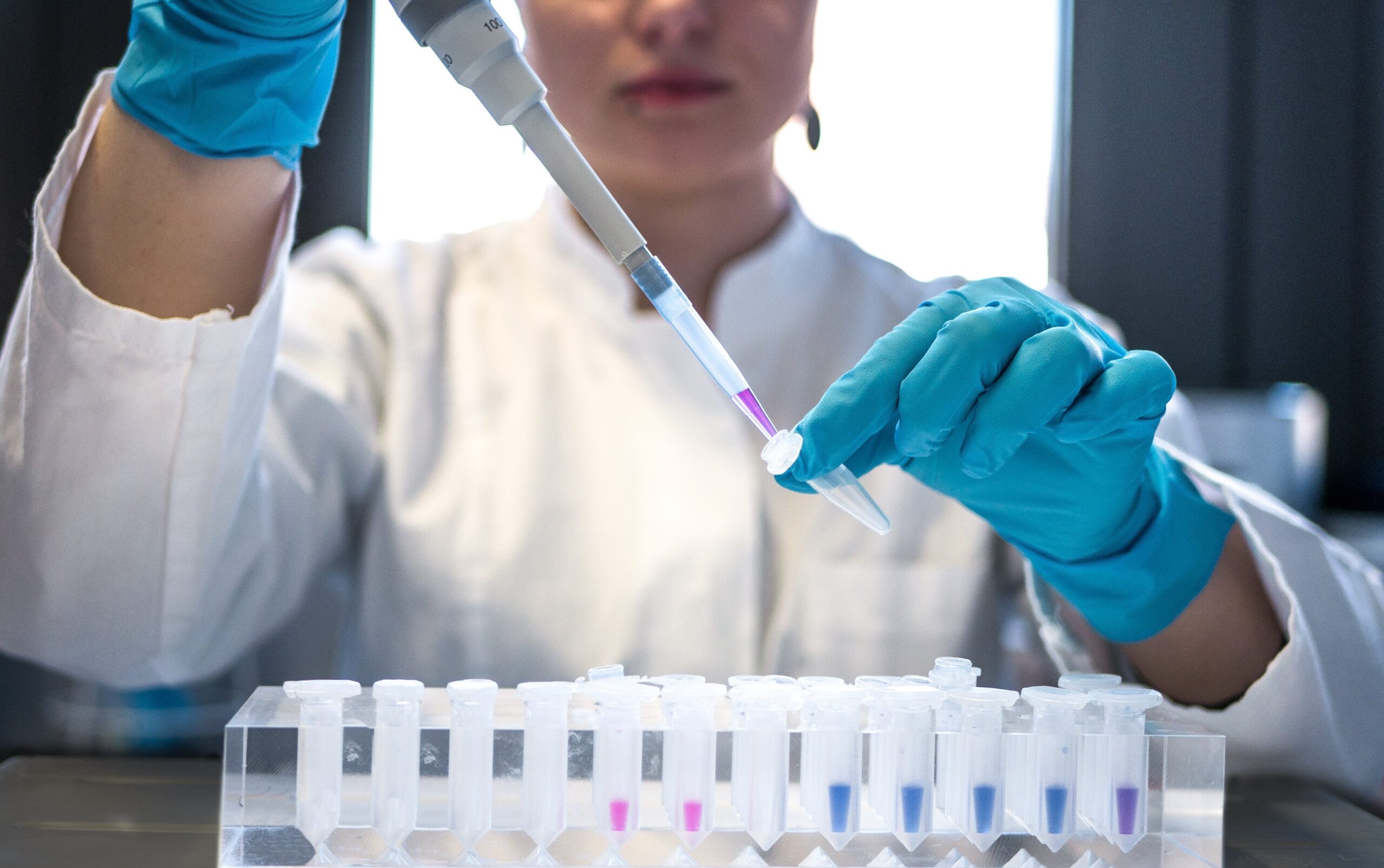Thinking of going for a Ph.D. in Biology? Well, if you’re going to spend the next 3 to 5 years of your life being grumpy and tired of every human being around you then at least it should be worth it. Isn’t that so? Since you’ll be doing a lot of research once you get into a Ph.D. program, I’ve spared you the time and effort in researching the worth of what you’re planning to do.
A Ph.D. in Biology can be worth it for individuals passionate about research, intellectual fulfillment, and making significant contributions to the field. However, it requires a substantial commitment of time, financial resources, and perseverance, and job market competitiveness should also be considered.
1- Worth-it Degree
According to the Statistica Report for the number of doctorate degrees earned in the United States in 2021, Biological Sciences stands at number 5 in the rank of most popular subjects for a doctorate degree.

Why wouldn’t you be interested in unraveling the mysteries of the living bodies, digging deep into the magical realm of the unseen? If you’re still not sure about your subject, you should check The Best Doctoral Degrees to get in 2023.
- Studying Complex Things: Biology is the study of the complex things in the universe (Richard Dawkins). It is one of the most intellectually stimulating subjects.
- Innovative Field: Imagine being at the cutting edge of innovation, contributing to the invention of new technology to overcome the biological hurdles.
- Treatment of Incurable Diseases: You can even think of finding a cure through your research of diseases like cancer or Alzheimer’s.
- Developing Ways To Combat Climate Change: You get to work on finding novel ways to combat climate change.
- Sustaining Global Population: You get to work on devising strategies to sustain a burgeoning global population.
- The Thrill of Research: Every day in the lab or in the field, you’re faced with myriad possibilities, and there’s a certain indescribable thrill that comes from potentially being the first person to discover something new about the world.
2- Multiple Options after the Degree
Turns out, the world of biology isn’t confined to the four walls of a lab. Who would’ve thought? You can do a lot more with this degree than you would have initially thought!
- Multiple Career Paths: A Ph.D. in Biology is like a multipurpose Swiss Army knife; it can carve you a career path in a multitude of directions.
- Making New Discoveries: There’s a unique thrill in contributing to the vast pool of human knowledge. As a Ph.D. researcher, you’re not just learning what others have discovered, but you’re pushing the boundaries of knowing, creating new knowledge. You’re standing on the shoulders of giants, sure, but you’re also climbing up to join their ranks.
- Intellectual Fulfillment: And so, here we stand, at the edge of this grand quest, peering into the void of the unknown. Is a Ph.D. in Biology worth it? After all the triumphs and the tribulations, the blood, sweat, and yes, more than a few tears, the intellectual fulfillment and the contributions you’ll be making to society will be worth it.
3- Wide Scope in Academia
The academia? Certainly! It’s the ancestral homeland of Ph.D. graduates, where knowledge is both the sword and shield.
- Employment Opportunities: The U.S. Bureau of Labor Statistics projects that employment for postsecondary teachers, which includes university professors, is projected to grow 9% from 2019 to 2029. That’s faster than the average for all occupations.
So, if you have an inner Dumbledore waiting to be unleashed, a world of chalk, blackboards, and inquisitive minds awaits you!
- High Chances of Success: A study on postdoctoral employment trends indicates that 29% of people with a Ph.D. in biological sciences end up securing a position in academia.
- Chances For a Tenured Position: If we look at the graph below, we find that 15% of Biology Ph.D. students get a tenured position in the first 6 years after their Ph.D.

A Ph.D. Is Not A Golden Ticket: Before you embark on this journey, it’s essential to realize that a Ph.D. is not a golden ticket into a world of academic fame and fortune.
Rather, it’s like a lengthy treasure hunt that involves blood (hopefully metaphorical), sweat (definitely real), and tears (possibly both). Many aspirants start with an initial interest in academia but as the journey begins, they start losing interest.
- You Might Lose Interest In Academia: There is also a sharp trend of declining interest in academia, 83% of the people who pursue a doctorate in life sciences start with the intention of going to academia but 25% of them later lose interest. You might be among that 25% but don’t worry, academia isn’t the only option you’ll have.

4- Internship opportunities
- You always have the option to do internships during your doctorate studies, giving you an insight into the market conditions and also helping you manage your finances.
- Some universities keep on offering several paid internships to their Ph.D. students such as the internship by Cambridge University for biological science students.
- You can also check the internship opportunity provided by Colorado State University for Cell and Molecular Biology students.
5- Corporate World
But what if you hear the siren call of the corporate world instead? Your research-oriented brains are like juicy worms for these corporate fish (pardon the analogy, my love for biology sometimes gets the best of me!). With the biotech industry being one of the fastest-growing sectors, having a Ph.D. can catapult you right into the heart of this exciting world.
- Biotech Companies:
- It turns out that many biotech companies like Genentech, Amgen, or even Google’s sister company Verily, have a soft spot for you with your PhD skills.
- Increasing Demand in the Private Sector: According to Elizabeth Marincola from the American Society for Cell Biology, the growing uncertainty associated with pursuing an academic career is making the private sector increasingly attractive to researchers. This can be your call!
- Working in the Industry: In 2004, the American Association for the Advancement of Science (AAAS) conducted a survey among life sciences scientists, exploring various aspects of their careers. The survey revealed that approximately two-thirds of the respondents were employed in academia, while 15 percent of the participants worked in the industry.
The highest-paying jobs after a Ph.D. in biology are:
| Job Title | Range | Average |
| Research Scientist | $59k – $122k | $86,396 |
| Assistant Professor, Postsecondary / Higher Education | $61k – $119k (Estimated *) | $84,815 |
| Clinical Research Scientist | $68k – $173k (Estimated *) | $111,461 |
| Staff Attorney | $60k – $114k (Estimated *) | $82,674 |
| Senior Data Analyst | $90k – $148k (Estimated *) | $115,781 |
| Postdoctoral Research Associate | $43k – $64k (Estimated *) | $52,886 |
6- High Jobs in the Government Sector
Let’s not forget the government sector. From shaping environmental policies to public health strategies, a Ph.D. in Biology can be the golden ticket to influencing real-world decisions.
The icing on the cake? Jobs in these sectors often come with better work-life balance and job security compared to the high-pressure environment of academia.
- Science Policy: Oh, let me tell you, the world of science policy is like the ultimate mashup of brains and bureaucracy! It’s where scientific research meets the wild world of public policy, and boy, is it an adventure.
- Government Agencies Need You: Imagine this: you’re a freshly minted Ph.D. graduate, armed with your scientific knowledge and ready to take on the world.
You step into the realm of government agencies, and suddenly you’re in demand like the latest smartphone during a Black Friday sale. Those agencies just can’t get enough of your expertise!
1. Policy Advisory & Analysis
- Science Policy Advisors.
- Public or government Policy Advisors
- Policy Analysts
2. Regulatory Affairs
Among the notable examples are
- Airama Albisa, Ph.D., pursued a career as a Regulatory Affairs Specialist in the pharmaceutical industry.
- Dignesh Shah, Ph.D., holds a similar position in a healthcare technology firm.
Both individuals showcase how Ph.D. graduates can excel in regulatory roles, leveraging their scientific expertise in industries with complex compliance requirements.
3. Labs & Research
Research Scientists can be found not only in universities and private industry but also within government sectors, so don’t worry, you’ll be in high demand!
- Molecular Biologists: Just as you can excel in policy advisory and regulatory affairs, there is a diverse range of opportunities to apply your qualifications. Surprisingly, governments emerge as significant employers of Molecular Biologists, particularly within federal roles focused on various fields such as
- Forensic science
- Biotechnology
- Disease Research
- Agricultural research
In these government positions, you can play crucial roles in advancing scientific knowledge, public health, and agricultural practices.
- Navigating The Labyrinth of A Ph.D. : As we straddle between the pragmatic considerations of pursuing a Ph.D. and the exhilarating thrill of scientific discovery, it’s crucial we pause a moment to delve into the lesser talked about aspects of this journey.
Like any epic voyage, the Ph.D. Odyssey comes with its fair share of perils and pitfalls. From grueling long hours to navigating the complex dynamics of academia, the path to a Ph.D. in Biology can sometimes feel like navigating through a labyrinth.
To Do or Not to Do a Ph.D. in Biology?
As we arrive at the crossroads of our thrilling expedition, the reality of our journey unfurls before us. After the seemingly endless tug-of-war, the blood, the sweat, do the fruits of this journey justify the arduous path taken?
Remember, It’s About the Journey:
If you’ve gathered anything from my musings, you would know that I firmly believe it does. But, and let me stress this, it’s mammoth ‘BUT,’ this is not a trail for the uninitiated or the faint-hearted. It’s a journey that’s less about the destination (the coveted ‘Dr.’ title) and more about the tumultuous ride itself. The Ph.D. ride, itself, might be harder than a job.
The Decision Is Yours:
In the grand scheme of things, my dear reader, the decision is ultimately yours. Should you choose to tread this path or carve out another, just remember, retain your sense of life. Keep the flame of your passion burning bright, and never let your curiosity wane. Because, in the beautiful words of Dr. Seuss, “Oh, the places you’ll go!”
A Ph.D. in Biology is not for Everyone But it Might Be For You:
You might still be questioning if you should get a Ph.D. or simply go for a job in the industry. As I draw the curtains on this tale of scientific exploration, remember, the Ph.D. journey isn’t for everyone. It is arduous, and taxing, and at times, you may feel like you’ve bitten off more than you can chew.
But for those who embark upon it, the rewards, both personal and professional, can be immeasurable. In the end, the decision to pursue a Ph.D. in Biology (or not) is a personal one. It should be based on your passions, your career goals, and your willingness to dedicate time to research.
FAQS
Should You Get A Ph.D. in Biology?
Getting a Ph.D. in Biology is worth it if you have a strong passion for research and want to contribute to scientific knowledge. You must be willing to commit to a challenging and lengthy academic journey. However, weigh the financial investment, job market prospects, and dedication required before making a decision.
How Hard it is to get a Ph.D. in Biology?
Oh, getting a Ph.D. in Biology is no walk in the park, that’s for sure! It’s a real challenge that requires serious commitment and hard work. You’ll be diving deep into research, spending years on your studies, and defending your thesis. But if you’re truly passionate about biology and hungry for knowledge, it can be an incredibly fulfilling journey.

